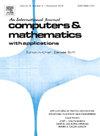Least-squares versus partial least-squares finite element methods: Robust a priori and a posteriori error estimates of augmented mixed finite element methods
IF 2.5
2区 数学
Q1 MATHEMATICS, APPLIED
引用次数: 0
Abstract
In this paper, for the generalized Darcy problem (an elliptic equation with discontinuous coefficients), we study a special partial Least-Squares (Galerkin-least-squares) method, known as the augmented mixed finite element method, and its relationship to the standard least-squares finite element method (LSFEM). Two versions of augmented mixed finite element methods are proposed in the paper with robust a priori and a posteriori error estimates. Augmented mixed finite element methods and the standard LSFEM uses the same a posteriori error estimator: the evaluations of numerical solutions at the corresponding least-squares functionals. As partial least-squares methods, the augmented mixed finite element methods are more flexible than the original LSFEMs. As comparisons, we discuss the mild non-robustness of a priori and a posteriori error estimates of the original LSFEMs. A special case that the -based LSFEM is robust is also presented for the first time. Extensive numerical experiments are presented to verify our findings.
最小二乘与偏最小二乘有限元方法:增广混合有限元方法的鲁棒先验和后验误差估计
本文针对广义Darcy问题(具有不连续系数的椭圆方程),研究了一种特殊的偏最小二乘(galerkin -最小二乘)方法,即增广混合有限元法,以及它与标准最小二乘有限元法(LSFEM)的关系。本文提出了两种具有鲁棒先验和后验误差估计的增广混合有限元方法。增广混合有限元方法与标准的LSFEM方法使用相同的后验误差估计量:在相应的最小二乘泛函处对数值解进行评估。增广混合有限元方法作为偏最小二乘方法,比原有的lsfem具有更大的灵活性。作为比较,我们讨论了原始lsfem的先验和后验误差估计的轻度非鲁棒性。本文还首次给出了基于l2的LSFEM具有鲁棒性的特例。提出了大量的数值实验来验证我们的发现。
本文章由计算机程序翻译,如有差异,请以英文原文为准。
求助全文
约1分钟内获得全文
求助全文
来源期刊

Computers & Mathematics with Applications
工程技术-计算机:跨学科应用
CiteScore
5.10
自引率
10.30%
发文量
396
审稿时长
9.9 weeks
期刊介绍:
Computers & Mathematics with Applications provides a medium of exchange for those engaged in fields contributing to building successful simulations for science and engineering using Partial Differential Equations (PDEs).
 求助内容:
求助内容: 应助结果提醒方式:
应助结果提醒方式:


